"Josiah held the feast of the Passover to his Lord in Jerusalem."
With these words First Esdras abruptly begins. It's a book that recounts the history of Judah, from the reforms of the king Josiah in the late 7th century BCE until Jerusalem's High Priest and former exile Ezra reads the law to the Jews in the late 5th century BCE.

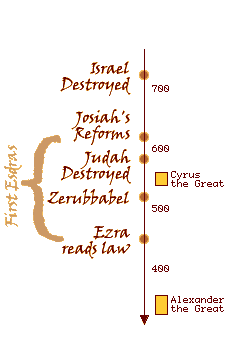
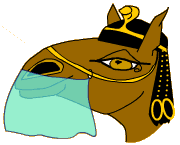
But why is it called Esdras? I think From King Josiah to Priest Ezra: 200 Years on the Roller Coaster of Jewish History would be more accurate and sell more books.

The name Esdras comes from the Greek form of the name Ezra, the last character in the book. And while I love your title Cleopatra, I think this Apocryphal book already has enough names. Not only is it known as First Esdras, but in the Vulgate is called III Esdras, and some nowadays call it 3 Ezra. That's because in the Vulgate, the Book of Ezra is called I Ezra, and Nehemiah is named II Ezra. Thus this is the third book attributed to Ezra. But for simplicity, let's just call it First Esdras.

The book of First Esdras is basically a reproduction of 2 Chronicles 35-36, Ezra, and Nehemiah 7:38-8:12, and for some mysterious reason ends mid-sentence of Nehemiah 8:13 with "And they assembled..." But there are some things that are unique to this book. The author seems motivated to emphasize three individuals who reformed Jewish worship: Josiah, Zerubbabel, and Ezra. The most famous story in First Esdras has to do with a contest involving Zerubbabel, a descendant of David who lead Jews back from exile to Jerusalem and who rebuilt the temple. It all takes place in the court of the Persian king Darius. And here is Darius to better explain the story.
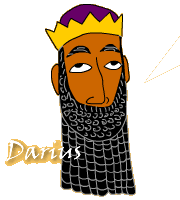
I'll never forget that day. The night before I threw one wing-ding of a party, and while I slept my three bodyguards decided to partake in a wisdom contest to determine what on earth is the strongest.
The first argued wine is the strongest, as it makes kings and orphans equal, and allows all people to forget sorrow and debt. The second argued that the king is the strongest, as they can demand things like war, and if people disobey their word-they die. The third bodyguard was a nice Jewish boy named Zerubbabel, and he said that women are the strongest, but truth is victor over all things. He explained that women give birth to kings and raise vintners who produce wine. They bring glory to men, and men cannot exist without them. Moreover, truth endures and prevails for ever and ever. It has no partiality, plays no favorites, and unlike wine, kings and women, truth alone is righteous.
While I didn't much care for my position as king being called "unrighteous," I had to admit Zerubbabel, you won the contest, and I granted you whatever you wanted. Do you remember what that was?
I sure do Darius. Earlier in your reign you had promised to live up to the vow of your father Cyrus and allow us Jews to rebuild the Jerusalem temple. It had been destroyed by the Babylonian army way back in 586 BCE, and we had been unable to carry out animal sacrifices to our God since then. With your permission and resources, I soon thereafter lead a group of Jews from Persia and Mesopotamia back to Jerusalem where we rebuilt the temple, inaugurating a period known as Second Temple Judaism. This lasted until the Romans destroyed the Temple once and for all in 70 CE.
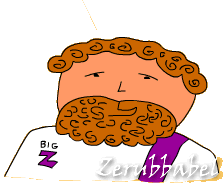
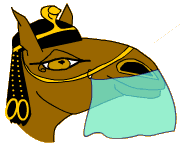
What a darling story Zerubbabel.
Now I am curious. Is II Esdras just as entertaining?

Sure is Cleopatra, but in an entirely different way.
You see, II Esdras is the only book in the Apocrypha that is apocalyptic, meaning it purports to unveil hidden mysteries.
So you might say, within the literary genre of apocryphal, apocalyptic, pseudepigraphal, intertestimental compositions, II Esdras ROCKS!


Well Mike... while I would never say it in precisely those terms, I suppose you might, if you weren't worried about your colleagues seeing such colloquial things.
But in any case, the main premise of II Esdras consists of seven revelations from the angel Uriel to Ezra, Jerusalem's priest. To better understand these mysteries, we've asked our friend the archangel Uriel to explain his revelations.
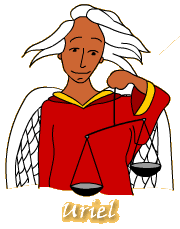
Thanks BibleDudes. My revelations to Ezra were recorded shortly after the destruction of Jerusalem and the Temple at the hands of the Roman Empire. Thus, II Esdras tries to explain divine justice and the fate of Israel.
My explanation of the causes of evil basically centered on the original sin of the first man, Adam, and how all humans since then are prone to evil and death. I also spoke of the mysterious incomprehensible aspects of the way the world works. I sort of tricked Ezra, and told him I would explain the causes of evil if he could do one of three things: weigh fire, measure the wind, or reverse time. He of course couldn't do any of these things, and so I felt he like all humans was incapable of understanding the world's mysteries.
I also discussed the difficulty in achieving salvation, and likened it to a narrow treacherous path. In another analogy, I said the end will be like a farmer's seeds, as only a few will escape destruction.
My revelations weren't meant to be happy. Rather, my book was a warning to straighten up and fly right. For example, II Esdras ends by saying that sin takes over like "a path overwhelmed with thorns so that none can pass through. It is shut off and given up to be destroyed by fire."

Yikes! I'd better stop sinning.
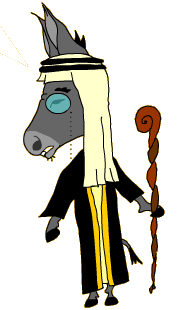
Hey BibleDudes! Can we cut the chit-chat and get on with Apocrypha?
I want to hear the famous story about bird-droppings, blindness, and fish gall bladders, commonly known as Tobit.